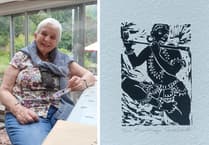Neighbourhood Policing gives officers the opportunity to make a real difference in their communities.
It offers challenges that allow them to make a real, valued contribution, and improve the lives of those they serve.
Last week the Neighbourhood Policing week of action took place – which recognises and celebrates the achievements of community policing.
PCSO Helen Fender epitomises neighbourhood policing and her work to tackle a difficult and complex issue that has blighted the community she serves for a number of years was recognised at Dyfed-Powys Police’s recent Annual Awards.
PCSO Fender has worked to bring an end to unscrupulous cockle pickers descending on the communities of places such as Laugharne, causing anti-social behaviour and adversely effecting those communities.
To effect change, PCSO Fender looked at the issue and its cause – pinpointing an old by-law that allowed anyone to get a free permit to pick cockles in the Three Rivers Fishery cockle beds.
In 2017 there were more than 1,000 permit holders and the only regulation for obtaining a permit is to give a name, address, contact details and a photograph for ID.
“I noticed that something had to be done, it couldn’t go on this way as it was causing no end of issues for the community and the genuine fishermen who relied on picking cockles for a living,” she said.
“On the Bury Inlet there was no issue as it was much harder to get a permit.”
PCSO Fender set about working with the Welsh Government to try and make the Three Rivers Fishery regulated as other cockle beds are.
A three-month consultation is being launched with the aim to bring in tougher legislation for permits to be issued – with requirements to include training, minimum kit standards, their employment status for HMRC and an annual fee of £800.
“I’ve worked with the communities and with the local fishermen on this, and they are supportive,” said PCSO Fender.
“When you’ve got 1,000 permits handed out to people from all over the country, there is going to be problems for the community and it impacts the local gatherers who depend on this industry to make a living.
“It was having a really detrimental effect on the lives of people in the area and it was proving dangerous, with numerous quads on the beaches and villages, even crossing railway lines.”
The issue has caused problems over the years with the Welsh Government Marine and Fisheries Division closing the Three Rivers Fishery cockle beds from 2012 to 2017 due to serious reports of anti-social behaviour, including people sleeping rough, litter not disposed of properly, no toilet facilities, and large articulated lorries trying to access small village roads.
Sgt Gemma Davies said: “Helen has conducted a thorough and detailed enquiry into the underlying issues at the location, has sourced expert opinion and discussed numerous options to try and implement change for the better for the cockling community and the people living near to the cockle beds.
“We’re hopeful to achieving a regulated permit system which can be monitored and ‘policed’ by the fisheries more effectively.”





Comments
This article has no comments yet. Be the first to leave a comment.